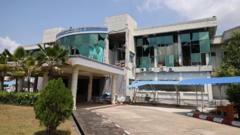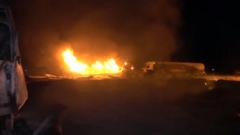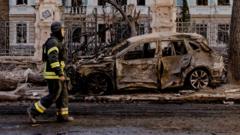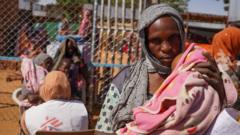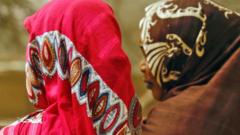Amid unending violence, a mother recounts her perilous journey as thousands flee the decimated Zamzam camp, seeking safety.
Sudan's Zamzam Camp: Chaos and Desperation Amid Attacks
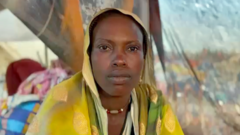
Sudan's Zamzam Camp: Chaos and Desperation Amid Attacks
Mother's harrowing escape highlights the ongoing humanitarian crisis in Sudan's Darfur region.
The ongoing civil unrest in Sudan has reached new heights as the Zamzam camp, home to over 700,000 internally displaced individuals, recently fell victim to brutal assaults by paramilitary forces. This camp had previously provided a fragile sense of security for those who had already fled their homes due to two decades of ongoing conflict in the Darfur region. Tragically, hopes were dashed when the Rapid Support Forces (RSF) unleashed violent attacks, causing widespread destruction and displacing thousands.
North Darfur Health Minister Ibrahim Khater, speaking to the BBC, described the aftermath: "Zamzam is completely destroyed. No-one is there." Among those forced to evacuate was 28-year-old Fathiya Mohammed, who embarked on a harrowing four-day journey to the town of Tawila—carrying one child on her back and another in her arms, with her belongings precariously balanced on her head.
Fathiya's ordeal grew more painful with the loss of her husband during the chaos. "We endured exhaustion, hunger, and thirst," she shared, adding that they were also robbed along the way to Tawila. The UN has reported that tens of thousands have fled to Tawila, seeking refuge but often finding overwhelmed facilities. Doctors Without Borders (MSF) reported staggering numbers, stating that over 20,000 individuals sought medical attention in just two days, revealing the grim reality that many were injured or traumatized.
Saadiya Adam, another victim of the violence, described how her makeshift home was burned down, alongside the livestock she depended on for survival. She lamented, "Everything I owned was burned. I have nothing left."
Eyewitness accounts of violence are grim, with bullet injuries becoming a common sight at Tawila's overwhelmed hospital. Medical staff describe harrowing situations, including a seven-month-old baby with severe injuries. Reports also surface of people left behind who could not escape the chaos, with MSF confirming that many vulnerable individuals could not make the dangerous journey to safety.
Established in 2004, Zamzam camp attempts to shelter those fleeing ethnic violence, but amidst the present turmoil, the future appears uncertain. The RSF's control over western Sudan, including Darfur, raises fears of further conflict and fragmentation of the country.
As Fathiya reflects on the devastation, she encapsulates the collective yearning for peace: "We want the war to stop. Peace is the most important thing." Her story represents just one among countless others caught in a cycle of violence that continues to claim lives and devastate communities.
The world watches as the humanitarian situation escalates, pleading for intervention in a crisis that demands urgent attention.

